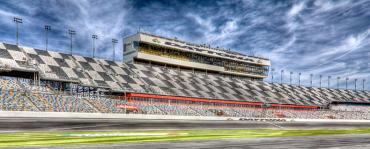
Florida's three professional football stadiums and Daytona International Speedway are seeking millions of dollars from the state to help pay for upgrades that in most cases are already underway.
The applications have been filed despite continued opposition from House leaders to such funding.
Applications submitted Monday --- the deadline to file --- were from Buccaneers Football Stadium Limited Partnership for Raymond James Stadium in Tampa and from the city of Jacksonville and the Jacksonville Jaguars for EverBank Field.
The speedway filed its application Friday, joining an earlier submission from South Florida Stadium LLC, which oversees the Miami Dolphins' home, Sun Life Stadium.
The Department of Economic Opportunity will begin reviewing the applications to determine the potential returns on investment and to rank the proposals for the 2016 stadium funding process.
Earlier this year, House leaders turned back attempts to steer state money to Sun Life Stadium, the speedway, EverBank Field and a soccer stadium in downtown Orlando.
Lately, House leaders have avoided the topic.
"This issue is not before the Legislature at this time," Michael Williams, a spokesman for House Speaker Steve Crisafulli, said Monday in an email.
Proponents of stadium funding say the money goes to projects that create jobs, attract tourists and increase regional trade.
Daytona International Speedway President Joie Chitwood III said in a release Monday that the speedway continues "to pursue all options to ensure the successful outcome of this process."
"As we move into the future, it is imperative that we continually make improvements to the facility to keep our guests, the majority of whom are visiting from outside the state of Florida, returning year after year," Chitwood said.
Critics, such as the conservative-advocacy group Americans for Prosperity, question the economic return on investment and call stadium funding "corporate welfare."
"Taxpayers' hard-earned dollars should be kept off the track, the field, or anywhere else that entails profit-seeking enterprises guzzling taxpayer gas," Americans for Prosperity-Florida spokesman Andres Malave said in an email Monday. "These projects are ongoing renovation projects that taxpayers shouldn't be on the hook for."
Malave added that the "House stood up to special interests in 2015, and we hope they will stand by taxpayers again in 2016."
The Daytona speedway and South Florida Stadium are each again seeking $90 million --- $3 million a year for 30 years.
The state agency didn't immediately release how much was requested for the Jacksonville and Tampa stadiums.
The state process allows stadium backers to apply for as much as $3 million a year when projects total more than $200 million. They can seek up to $2 million a year if construction or improvements are between $100 million and $200 million. The requested amount is limited to $1 million a year when the work is below $100 million.
Jacksonville sought $1 million a year for three decades from the state during the 2015 process.
In a letter accompanying its latest application, Jacksonville Chief Administrative Officer Sam Mousa and Jaguars General Counsel Megha Parekh indicated the proposal could soon be updated.
"The city and the Jaguars are currently negotiating $90 million in additional improvements to EverBank Field and its surrounding premises, including club space improvements, a covered practice field, and an amphitheater; this will bring the total public-private investment in the stadium to $172.7 million during the application period," they wrote the state.
The Tampa Bay Buccaneers, who play in the Hillsborough County-owned Raymond James Stadium, have been in discussions with the county and the Tampa Sports Authority for $75 million to $100 million in upgrades to the facility.
The application submitted by Daytona International Speedway is an updated version of the paperwork filed a year ago, according to a speedway spokesman.
In the prior application, the speedway said a front-stretch expansion will in addition to auto races "attract non-sports events that bring thousands of visitors to Florida and pump millions of dollars into the economy."
The project, known as Daytona Rising, is a $400 million "reimaging" of the raceway's stands with expanded and redesigned entrances, seating and social areas. The work, started in July 2013, is expected to be completed by the 2016 Rolex 24 At Daytona and the Daytona 500.
The Tampa football stadium proposal is being reviewed before it will be released to the public, a state spokeswoman said.
South Florida Stadium, which is undergoing at least $350 million in renovations, simply refilled its earlier applications.
The phased Sun Life Stadium work, started earlier this year, will reduce seating by more than 10,000, put a canopy over 91 percent of the crowd, and include four new giant high-definition video boards. Ron Book, a lobbyist for Sun Life Stadium, has said the project is about economic development.
The Legislature created a new funding method for professional stadiums in 2014 in an attempt to reduce the lobbying from prior years for state money. Initially $7 million was set aside in potential sales-tax revenue that could go to stadium projects, with the annual pool of money growing to $13 million in 2016.
The law gives the Department of Economic Opportunity 60 days to determine if an application should go forward and to rank all the applications by Feb. 1, something the agency didn't do with the four proposals that were made for the 2015 legislative session.


